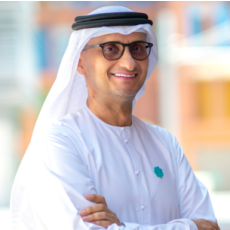Can you start with Masdar’s City innovations in sustainable urban development, particularly the region's first net zero energy buildings like the Link and Masdar City Square?
I joined Masdar City in 2009, at a time when sustainable urban development was relatively new, both regionally and globally. It was a challenging yet enlightening experience to understand how sustainability could drive new technologies and accelerate growth. Cities today contribute over 40% of the global carbon footprint, and as urban populations grow alongside technological advancements, the pressure to create more sustainable and green cities increases.
Masdar City's journey began in 2006 under the visionary leadership of the UAE and Abu Dhabi. Our goal was to create a futuristic, sustainable city. The initial focus was on foundational elements, like the master plan's orientation to maximize natural resources like the sun and wind. As a result, Masdar City is approximately 10 degrees cooler than downtown Abu Dhabi due to our passive design elements, such as low-rise buildings that shade each other. This approach aims to harness nature to build sustainable, socially attractive communities.
Innovation has been key to our progress from day one. We consistently run pilot projects in various fields like agri-tech, water management, and power generation to test new technologies. These projects help us determine what works best in our environment. For example, we've been adapting autonomous vehicles since 2009, which have transported over 3 million passengers. We're now on our third or fourth generation of these vehicles, ensuring they suit our specific needs.
How did Masdar City achieve its green building milestones, like the first net zero energy commercial building, and what are your future goals in this area?
Our green building journey began from the outset. The initial buildings in Masdar City were designed to save up to 40% of water, a significant achievement 14-15 years ago. We moved on to more challenging projects like the IRENA headquarters, which saves up to 60% of energy. At COP28 last year, we announced the NZ1 building, which incorporates solar panels and other advanced technologies to be designed for net-zero as it generates 100% of its energy needs on-site.
Currently, we have seven projects complete or under construction, all targeting net zero status. One of the most significant is the Masdar City Square (MC Square), which will house the Department of Energy in a net-zero HQ, demonstrating both governmental and sector commitment to sustainability. The Link is another exciting project, designed to foster collaboration among international entrepreneurs in its net-zero colab building, which includes co-working and co-living spaces for our thriving community of over 1,100 companies.
What are some of the key projects and innovations Masdar City is currently working on?
One of our flagship projects is the Masdar City Square HQ building, which is a highly integrated photovoltaics building and will be our first net zero project at scale, set to complete by early next year.
We are around 88-89% finished. Other buildings in the pipeline, though smaller, aim to prove that large-scale sustainable projects are feasible and financially viable. Our buildings are designed to prioritize occupant wellness, receiving WELL certifications and incorporating amenities like gyms, cafes, food hubs, and nurseries to create self-contained, walkable communities.
These projects illustrate our commitment to sustainability and innovation. For instance, our smart center collects data on energy and water consumption to optimize building performance and occupant behavior. This data-driven approach helps us continually improve our sustainability practices.
Masdar City also focuses on social and environmental sustainability. Can you tell us about the region's first net zero energy mosque and its significance?
Net zero is a challenging goal, but we always strive to push boundaries in sustainability. Beyond financial and commercial sustainability, social sustainability is crucial. As our community grows, we recognized the need for a larger mosque. The net zero mosque, accommodating 1,300 worshippers, is designed to be energy-efficient and iconic.
Mosques are used intensively for short periods and then left idle, consuming energy unnecessarily. By designing a net zero mosque, we aim to set a new standard that can be replicated across the region. This project utilizes our extensive data and experience from over 15 years of sustainable development to minimize energy use and implement innovative solutions.
Why should companies from around the world consider setting up in Masdar City’s free zone?
We have created a vibrant ecosystems that attracts like-minded, talented individuals. Masdar City’s journey began with R&D across various industries, including AI, energy, mobility, life sciences, and space. For instance, the Mohamed bin Zayed University of Artificial Intelligence drives our AI initiatives, impacting sectors from energy to healthcare.
We have strong clusters in clean energy, with entities like IRENA and numerous other companies and initiatives based here. Our healthcare and life sciences cluster aligns with Abu Dhabi's vision to lead in this domain. Additionally, the UAE Space Agency is in Masdar City which exemplifies our commitment to diverse, high-impact industries.
Our free zone offers a one-stop-shop solution, facilitating smooth business operations. An example is a US company called Attentive Science that recently established its MENA headquarters here, focusing on innovation and R&D in life sciences and biomedicine. This holistic approach, combining free zone benefits with a supportive ecosystem, makes Masdar City an ideal location for global companies.
We believe that by fostering innovation and sustainability, Masdar City provides a unique environment where businesses can thrive and contribute to a sustainable future.






